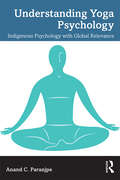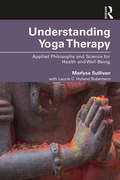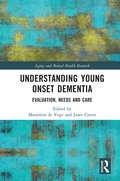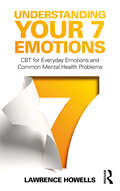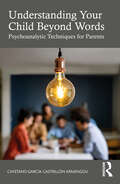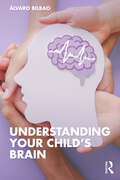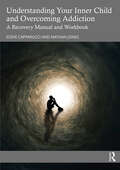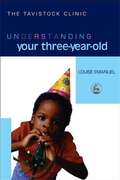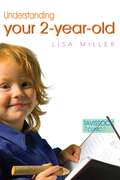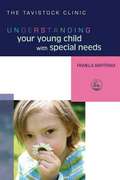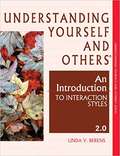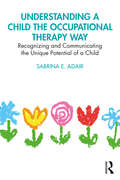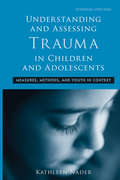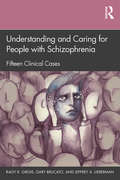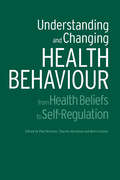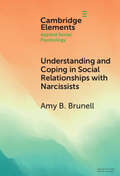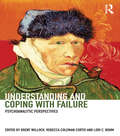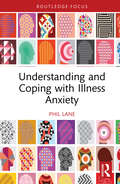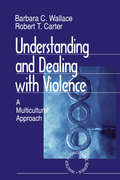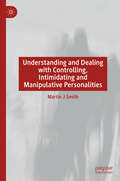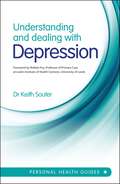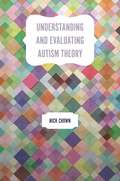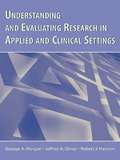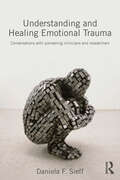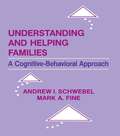- Table View
- List View
Understanding Yoga Psychology: Indigenous Psychology with Global Relevance
by Anand C. ParanjpeThis book is an introduction to Patañjali’s Yoga Sūtras and its core concepts about the self, suffering and consciousness. It highlights its relevance to contemporary theories and applications in the fields of psychology and health. The book adopts sociology of knowledge as a broad framework as it delves into the core concepts of yoga psychology in the Yoga Sūtras in the context of worldviews and frameworks present in the Upanisads and the Sāṁkhya system. It provides an interpretation of Kriya Yoga and its practice in pursuit of spiritual upliftment, and concept of Samādhi or the transformation of consciousness using the language and idiom of contemporary psychology. It draws parallels between yoga psychology and the ideas of Husserl, Jung and Piaget while reconciling the seemingly disparate cultural, religious, spiritual, and intellectual traditions of eastern spirituality and schools of modern psychology. The book also discusses yoga psychology in relation to psychoanalysis, radical behaviorism as well as mainstream, cognitive, humanistic, transpersonal and indigenous psychologies and provides a guide to both the theories of yoga psychology and its applications. This book will be of interest to students, teachers, researchers and practitioners of psychology, psychiatry, philosophy and yoga psychology as well as to psychologists, psychiatrists, counselors, mental health professionals, clinical psychologists, and yoga enthusiasts.
Understanding Yoga Therapy: Applied Philosophy and Science for Health and Well-Being
by Marlysa B. Sullivan Laurie C. Hyland RobertsonUnderstanding Yoga Therapy offers a comprehensive and accessible perspective on yoga therapy as a complementary, integrative route to promoting whole-person well-being. Readers will come away from the book understanding how the philosophy, texts, and teachings of yoga benefit a wide range of health conditions. The book is split into three helpful sections: Part I discusses foundational texts and their interpretations; Part II outlines the biopsychosocial-spiritual and neurophysiological model of integrative health pertinent to yoga therapy; and Part III focuses on practical applications separate from the more familiar diagnosis-driven models. Experiential activities and case studies throughout the text illuminate how yogic practices can be incorporated for optimal health. Bridging the ancient and modern, philosophical and scientific, Understanding Yoga Therapy offers a clear explanatory framework for yoga therapists, physicians, allied and complementary healthcare providers, and their patients and students.
Understanding Young Onset Dementia: Evaluation, Needs and Care (Aging and Mental Health Research)
by Marjolein De VugtUnderstanding Young Onset Dementia provides a state-of-the-art overview of approaches to care and evaluation for people with young onset dementia. It reviews the challenges in providing care and services, outlines new innovations in treatment and explores the impact of the condition to offer guidance about best practice in care. Written by world-leading researchers and experts in the field, this book gives key evidence for best practice and focuses on lived experience of those with young onset dementia. It has a broad focus looking at aspects of care beyond diagnosis and gives a comprehensive summary of the current qualitative and quantitative research in the field of young onset dementia. This international collaboration fills a much-needed gap in the academic market and is vital to guide learning and deliver future innovations. This book will be of great interest for academics, scholars and post graduate students in the field of mental health and dementia research. It will also appeal to neurologists, psychiatrist, geriatricians and psychologists looking to update their knowledge or already working in the field.
Understanding Your 7 Emotions: CBT for Everyday Emotions and Common Mental Health Problems
by Lawrence HowellsUnderstanding Your 7 Emotions explains how emotions help us to respond to the world around us and are fundamental to our existence. The book provides a detailed understanding of the main human emotions – fear, sadness, anger, disgust, guilt, shame and happiness – showing how to live with them and how to resolve problems with them. Each of the seven chapters also includes an ‘emotional trap’ to highlight what happens when we get stuck responding in unhelpful ways and explains how to get out of the trap. Grounded in emotion science and cognitive behavioural therapy, the book provides a powerful alternative to mental health diagnosis. Examples and exercises are provided throughout to help apply the ideas in everyday life and achieve health and happiness. This easy-to-read guide will help anybody who is interested in emotions or is struggling with common mental health problems to better understand how emotions work and improve their own and others' mental health and emotional wellbeing. It will also be an invaluable resource to those working in the caring professions.
Understanding Your Child Beyond Words: Psychoanalytic Techniques for Parents
by Cayetano García-Castrillón ArmengouUnderstanding Your Child Beyond Words: Psychoanalytic Techniques for Parents will help you unlock a deeper knowledge of your child's feelings, inviting you to explore the deepest questions about parenting and find meaningful answers.In this book, expert psychoanalyst Cayetano García-Castrillón Armengou teaches you how to look beyond your child's spoken and non-verbal behavior to truly listen to them. By adopting the methods explored in the book, you will become open to new ideas on how to talk, act, and guide your child more effectively. This understanding will help your family grow together, avoid common misunderstandings, and create lasting, meaningful relationships. The book uses simple language and offers numerous examples from everyday reality, showing how everyone in the family can get to know each other better.Whether your child is already in therapy, you’re considering it, or you simply want to enhance your parenting approach, this book provides invaluable insights and guidance to help you unlock your family’s full potential.
Understanding Your Child's Brain
by Álvaro BilbaoUnderstanding Your Child's Brain simplifies the neuroscience behind what is going on in a child’s brain during the first six years of life to help parents develop the full intellectual and emotional potential of their children. The book starts with an accessible explanation of the pillars and principals to understanding the child’s brain. It then provides tools to helps parents communicate more effectively with, nurture empathy in, and enforce rules and positive behaviours for their children. Examining how to develop the emotional intelligence of children as well as their intellect, the chapters examine how to raise children based on trust, assertiveness, and fearlessness, while also providing support and exercises in improving language, memory, creativity, and self-control. This book offers parents and educators practical solutions to parenting problems and realistic advice for ensuring the healthy emotional and intellectual development of their children. It will also be relevant to all mental health professionals who want to be more assertive when talking to parents about their child’s problems and growth.
Understanding Your Inner Child and Overcoming Addiction: A Recovery Manual and Workbook
by Nathan Jones Eddie CapparucciThis book provides a comprehensive overview of the Inner Child Model™ for treating Addictive Behaviors, a trauma-based approach to the treatment of various addictions including alcohol, drugs, food, gambling, sex, spending, smoking, etc. Research indicates the onset of addiction originates in childhood trauma, inability to process emotional discomfort, and attachment disorders. This book addresses each of these issues to assist individuals in overcoming the drivers of addictive behaviors. But more importantly, provides solutions to help those who struggle to learn to manage their addiction. It contains numerous case studies in which readers will see themselves and their stories throughout the pages and assists readers in generating a comprehensive recovery roadmap that will provide real-world solutions to staying one step ahead of their addiction. While there have been books written about the Inner Child, few focus on how the Inner Child impacts addiction. This unique and interactive therapeutic approach empowers individuals by assisting them in understanding "why" they engage in addictive behaviors. This book is written for anyone struggling with behavioral/substance addiction, their loved ones, and clinicians working in the field of addiction treatment.
Understanding Your Three-Year-Old
by Louise EmanuelWhat changes when a young child begins to leave toddlerhood behind? How do you keep track of your child's good and bad experiences at nursery and kindergarten and support her through them? What is the best way to cope with temper tantrums, and why do they happen? Louise Emanuel presents practical tips and a great deal of emotional reassurance for both the first-time and the experienced parent. She offers helpful guidance on a range of topics, from managing sibling rivalry and ensuring everyone in the family gets a good night's sleep, to encouraging conversation and imaginative solitary and social play.
Understanding Your Two-Year-Old
by Lisa MillerWhat makes children in their 'terrible twos' behave as they do? How can parents decide when their child is ready for day care, and manage their child's transition to a trusted child minder? Lisa Miller guides parents through their two-year-old's development, from how to deal with a 'bossy boots' to understanding the central importance of toys, and the development of language and nonverbal communicative skills. She describes ways in which parents can help a young child express or resolve difficult feelings or jealousy, come to accept and welcome a new-born sibling, and negotiate friendships.
Understanding Your Young Child With Special Needs
by Pamela BartramParenting children is always a challenging process, and parenting a young child with special needs presents extra challenges. This book offers an insight into how disability impacts on the normal stages of child development during the first five years. Placing the child and his or her personality, family life, feelings and behaviours at the centre of the book, Bartram addresses all the 'ordinary' challenges and tasks of parenting, such as sibling relationships, nursery and school, toilet training, and healthy aggression, as well as those that are of particular relevance to the parents of young children with special needs. This accessible book provides a wealth of information to help the parent of a young child with special needs, and is also of interest to professionals working with babies and pre-school children with special needs. Book jacket.
Understanding Yourself and Others: An Introduction to Interaction Styles 2.0
by Linda V. BerensUnderstanding Yourself and Others: An Introduction to Interaction Styles reveals the four fundamental interaction style patterns for you to "try on" in your search for understanding yourself (and others). Within these patterns are clues to the "how" of our behaviors. Find out how you consistently see to fall into certain roles in your interactions with others and how you can shift your energies to take on other roles when necessary. <P><P> After seven years of working with this groundbreaking model, Linda Berens has completed version 2.0. She added two additional pages for each Interaction Style with expanded arrow pattern descriptions AND snapshots of four variations for each style. In addition, there is a new page devoted to the four energy patterns and the four decision-making styles. <P><P> A conceptual change was made in the Things-in-Common section to help people clarify their Interaction Style. The focus on Control versus Movement was changed to a more bias free dichotomy of focus on Outcome versus focus on Process.
Understanding a Child the Occupational Therapy Way: Recognizing and Communicating the Unique Potential of a Child
by Sabrina E. AdairThis book uses an occupational therapy way of thinking to guide the reader towards observing, understanding, and communicating the needs of children to foster a supportive environment. Presented in accessible, everyday language, this book takes a holistic approach of looking at a child from what makes them a unique person, what activities they are trying to accomplish, and what environment they are in. Each chapter helps readers identify, describe, and clearly articulate a different aspect of the child’s environment and how it may affect them, the way that they process different sensory inputs, what their behaviors may be telling us, and how they learn. By recognizing each child’s unique story and effectively communicating their story to others, the reader can identify the most effective ways to support a child to meet a child’s needs and set them up for success. Therapists, educators, parents, and childcare workers will all benefit from the simple strategies outlined in this book to enrich a child’s learning.
Understanding and Assessing Trauma in Children and Adolescents: Measures, Methods, and Youth in Context (Psychosocial Stress Series #Vol. 35)
by Kathleen NaderIn this volume, Kathleen Nader has compiled an articulate and comprehensive guide to the complex process of assessment in youth and adolescent trauma. There are many issues that are important to evaluating children and adolescents, and it is increasingly clear that reliance on just one type of assessment does not provide the most accurate results. From history to recent advances, this book covers a wide range of methods and measures for assessing trauma, including case examples to illustrate the integration of these different facets. Altogether, the broad scope and inclusive depth of this work make it an essential addition to the field of trauma assessment.
Understanding and Caring for People with Schizophrenia: Fifteen Clinical Cases
by Jeffrey A. Lieberman Gary Brucato Ragy R. GirgisThis book challenges professional and public misconceptions of schizophrenia as an illness with intractable symptoms and inexorable mental deterioration, educating clinicians and researchers on the effectiveness of treatment to change the course of or prevent the onset of illness. The authors illustrate such effectiveness through fifteen case studies examining psychosis in diverse clients. These case studies are divided into the three phases of the illness—prodromal/clinical high risk, first-episode, chronic, and treatment-refractory—with accompanying analyses of the causes, symptoms, interventions and treatments. By depicting patients at different clinical stages of the illness, with accompanying explanations of how they got to that point, what might have been done to avoid – or has been done to achieve – this outcome, the reader will gain an appreciation of the nature of the illness and for the therapeutic potential of currently available treatments. Readers will learn about the various clinical aspects of schizophrenia and treatment including diagnosis, prognosis, clinical presentation, suicide risk, cognitive deficits, stigma, medication management, and psychosocial interventions.
Understanding and Changing Health Behaviour: From Health Beliefs to Self-Regulation
by Paul Norman Charles Abraham Mark ConnerThe identification of the factors predicting health behaviour has become a major focus of research in the field of health psychology and related disciplines. This awareness not only increases our understanding but also provides important targets for interventions to change health behaviour. Understanding and Changing Health Behaviour focuses on a range of key social cognitive factors in this process, using examples from an impressive breadth of applied settings that include smoking cessation, condom use and breast examination. The book features contributions from some of the best known researchers in the field.
Understanding and Coping in Social Relationships with Narcissists (Elements in Applied Social Psychology)
by Amy B. BrunellNarcissism is a trait that comes in different forms (agentic, communal, and vulnerable), which are all marked by characteristics such as entitlement, self-centeredness, and little empathy for others. One reason narcissism has gained attention among scholars and laypeople alike is because of its implications for social relationships. Narcissists' behaviors frequently have negative consequences for others. Whether their relationships are with coworkers or close relationship partners, interactions with narcissists can be challenging and emotionally taxing. Despite this, there is a sparse amount of research that addresses how to cope with difficult narcissistic relationships. This Element includes an overview of the trait forms of narcissism and discusses its implications for their social relationships. It provides a background about the development of narcissism and offers some research-informed suggestions for how to cope in narcissistic relationships. Future directions for research are also discussed.
Understanding and Coping with Failure: Psychoanalytic Perspectives
by Brent Willock Rebecca Coleman Curtis Lori C. BohmFailure is a theme of great importance in most clinical conditions, and in everyday life, from birth until death. Its impact can be destabilizing, even disastrous. In spite of these facts, there has been no comprehensive psychoanalytic exploration of this topic. Understanding and Coping with Failure: Psychoanalytic Perspectives fills this gap by examining failure from many perspectives. It goes a long way toward increasing understanding of the numerous issues involved, and provides many valuable insights into ways of coping with these challenging experiences and several chapters discuss positive aspects of failure - what can be learned from what would otherwise simply be regrettable experiences. Brent Willock, Rebecca Coleman Curtis and Lori C. Bohm bring together a rich diversity of topics explored in thoughtful ways by an international group of authors from the United Kingdom, Canada, and the United States of America. Failed therapies (which have been examined in the literature) are but one element freshly explored in this comprehensive exploration of the topic. The book is divided into sections covering the following topics: Failing and Forgiving; Society-Wide Failure; Failure in the Family; Therapeutic Failure; Professional Failure in the Consulting Room and on the Career Path; Integrity versus Despair: Facing Failure in the Final Phase of the Life Cycle; Metaphoric Bridges and Creativity; The Long Shadow of Childhood Relational Trauma. Understanding and Coping with Failure will be eagerly welcomed by all those trying to increase their awareness, understanding, and capacity to work with the many ramifications of this important issue. Because of the uniqueness of this broad, detailed exploration of the complexities of the failure experience, it will be essential reading for psychoanalysts, psychotherapists, psychologists, psychiatrists, social workers, counselors, and students in these disciplines. It will also appeal to a wider audience interested in the psychoanalytic perspective.
Understanding and Coping with Illness Anxiety (Routledge Focus on Mental Health)
by Phil LaneThis book offers comfort and psychoeducation to readers as well as psychological explanation of concepts to mental health and medical professionals. The importance of understanding how disease, illness, and health affect our emotional and mental wellbeing cannot be understated. The book is divided into four sections: a description of illness anxiety and its diagnostic criteria; coping strategies for managing illness-related anxiety; a section describing how patients heal from Illness Anxiety Disorder; and a section containing practical exercises, meditations, and activities. This book is a relevant resource that will highlight an underrepresented area of psychological literature.
Understanding and Dealing With Violence: A Multicultural Approach
by Robert T. Carter Barbara C WallaceUnderstanding and Dealing with Violence: A Multicultural Approach situates violence within a social, cultural, and historical context. Edited by distinguished scholars Barbara C. Wallace and Robert T. Carter, this unique volume explores historical factors, socialization influences, and the historical and contemporary dynamics between the oppressed and the oppressor. State-of-the-art research guides a diverse group of psychologists, educators, policy-makers, religious leaders, community members, victims, and perpetrators in finding viable solutions to violence.
Understanding and Dealing with Controlling, Intimidating and Manipulative Personalities
by Martin J SmithThis book will examine at individuals who control, intimate, and manipulate in work, home, family, and social environments, using robust Psychological theory to comprehend and successfully tackle those who exhibit these behaviours. The focus of this book will be to look at general Personality theory together with more specific focus on the Dark Triad of personality traits and, from the Five Factor Model, the domain of Agreeableness vs Antagonism. This approach will build a greater understanding of a much broader form of controlling intimidating and manipulative personality type. The book will include both useable techniques as well as self-reflection exercises the reader can use or pass on to students, clients and service users. This book is based on a programme the author has been teaching for over twelve years to a range of audiences across a variety of roles and has also been highlighted frequently in the press over the past decade.
Understanding and Dealing with Depression
by Keith SouterDepression affects 1 in 5 adults at some point during their lives, and for many people it can seriously affect their quality of life, as well as having a significant effect on family and friends. This book gives the basic information needed to understand what depression is, how to recognise it, and, most essentially, how to deal with it.
Understanding and Evaluating Autism Theory
by Nick ChownAddressing the full spectrum of theoretical output associated with autism and Asperger syndrome, this is the complete guide to autism theory - spanning from mainstream and alternative, through to non-autism specific theories that might be applied to autism. Previous study on autism has made significant inroads into the individual branches of autism theory, however, no text has brought together the complete range of theories in an accessible textbook for students and academics. The author argues that a more obvious application of theory to autism intervention would be beneficial to practitioners. With access to the complete range of available autism and Asperger syndrome theory, from development theories to learning style theories, the academics and students working towards the practical application of theory to intervention will have all the necessary information at their disposal. The book is based on a series of autism theory lectures delivered for the NAS and Sheffield Hallam University.
Understanding and Evaluating Research in Applied and Clinical Settings
by George A. Morgan Jeffrey A. Gliner Robert J. HarmonClinically oriented professionals and students need to understand and evaluate the research and statistics in professional articles, especially given today's emphasis on evidence-based practice. This book demonstrates how the research approach and design help determine the appropriate statistical analysis. Understanding and Evaluating Research in Applied and Clinical Settings features:*short, independent, chapters that do not have to be read in order;*a guide to understanding why a particular statistic was selected;*an emphasis on effects sizes including measures of risk potency;*numerous cross-disciplinary examples to illustrate the material; and*methods to help determine practical and clinical significance and their relation to meta-analysis and evidence-based practice.This book is intended for practitioners and students in psychology, education, counseling, mental and allied health, nursing, and medicine, and as a text for courses on understanding research methods and statistics.
Understanding and Healing Emotional Trauma: Conversations with pioneering clinicians and researchers
by Daniela F. SieffUnderstanding and Healing Emotional Trauma is an interdisciplinary book which explores our current understanding of the forces involved in both the creation and healing of emotional trauma. Through engaging conversations with pioneering clinicians and researchers, Daniela F. Sieff offers accessible yet substantial answers to questions such as: What is emotional trauma? What are the causes? What are its consequences? What does it mean to heal emotional trauma? and How can healing be achieved? These questions are addressed through three interrelated perspectives: psychotherapy, neurobiology and evolution. Psychotherapeutic perspectives take us inside the world of the unconscious mind and body to illuminate how emotional trauma distorts our relationships with ourselves and with other people (Donald Kalsched, Bruce Lloyd, Tina Stromsted, Marion Woodman). Neurobiological perspectives explore how trauma impacts the systems that mediate our emotional lives and well-being (Ellert Nijenhuis, Allan Schore, Daniel Siegel). And evolutionary perspectives contextualise emotional trauma in terms of the legacy we have inherited from our distant ancestors (James Chisholm, Sarah Blaffer Hrdy, Randolph Nesse). Transforming lives affected by emotional trauma is possible, but it can be a difficult process. The insights shared in these lively and informative conversations can support and facilitate that process.This book will therefore be a valuable resource for psychotherapists, psychologists, counsellors and other mental health professionals in practice and training, and also for members of the general public who are endeavouring to find ways through their own emotional trauma. In addition, because emotional trauma often has its roots in childhood, this book will also be of interest and value to parents, teachers and anyone concerned with the care of children.
Understanding and Helping Families: A Cognitive-behavioral Approach
by Andrew I. Schwebel Mark A. Fine Andrew SchwebelThis book presents a new approach to understanding the family unit and how and why it functions as it does. The approach focuses on the cognitions of family members and how these, in turn, shape individuals' behavior and the functioning of the family system. The use of the cognitive-behavioral perspective in family science has gained a quick and broad acceptance among social scientists and practitioners during the past decade. One reason for its success is that the basics of the approach are easy to learn and apply. Specifically, the approach maintains that a person who believes that he or she is a failure will -- because of this cognition -- act in certain self-defeating ways and have various self-deprecating feelings. The wide acceptance of the cognitive-behavioral approach rests on more than its simplicity: the approach has repeatedly proven itself in the laboratory and in the clinic. The knowledge readers of this volume will gain about the cognitive-behavioral approach provides them with tools that they can use to better understand not only the family interactions, but the thoughts, feelings, and behaviors of individuals -- including themselves -- in the family setting.
